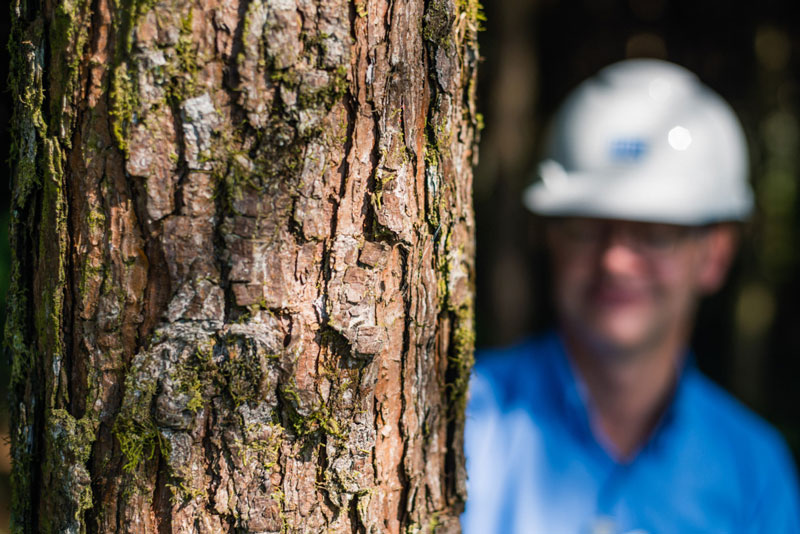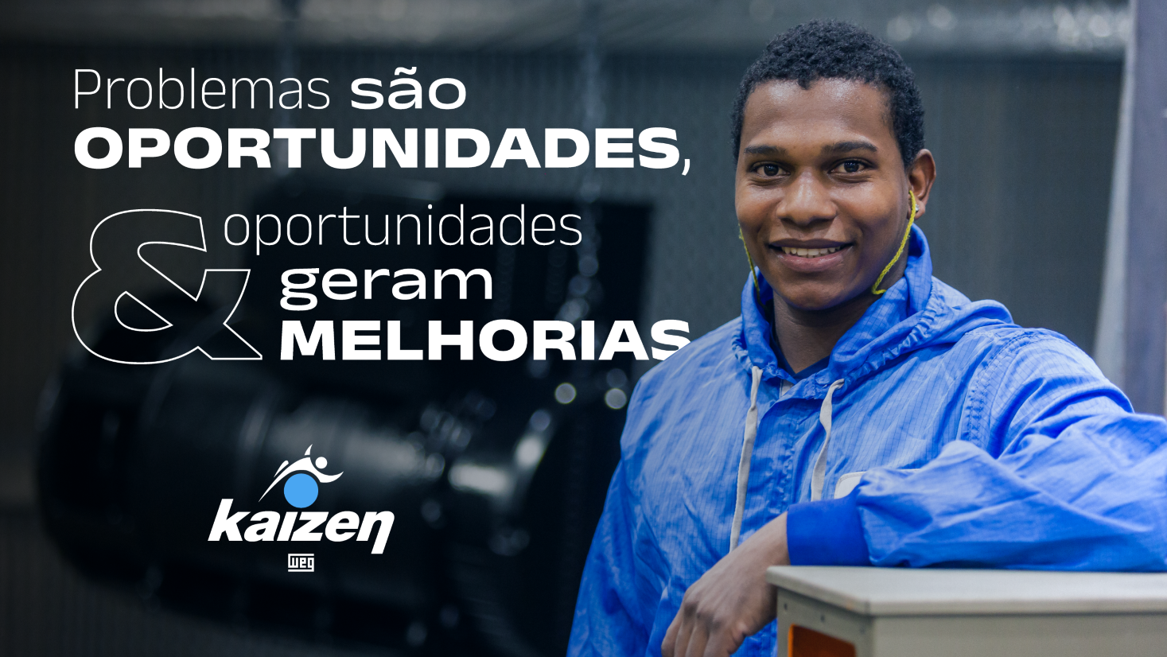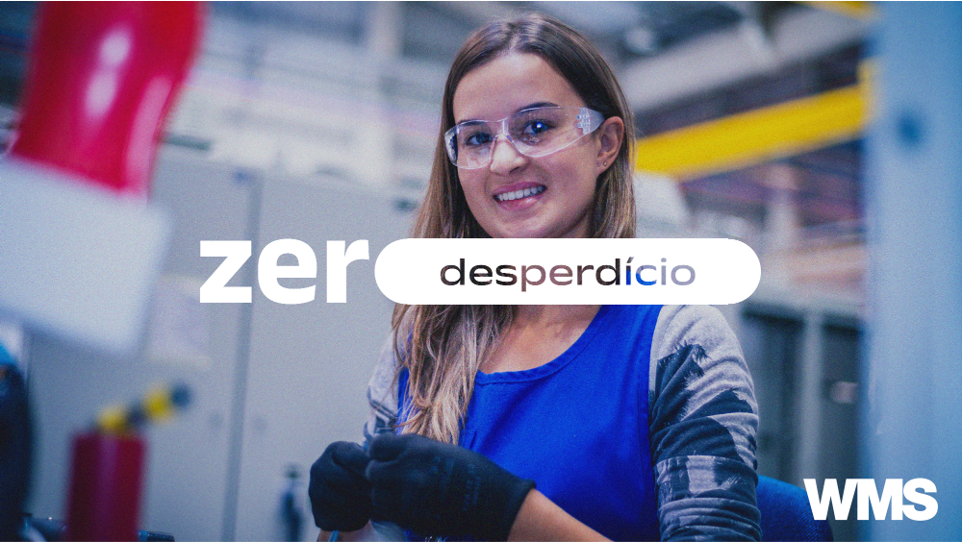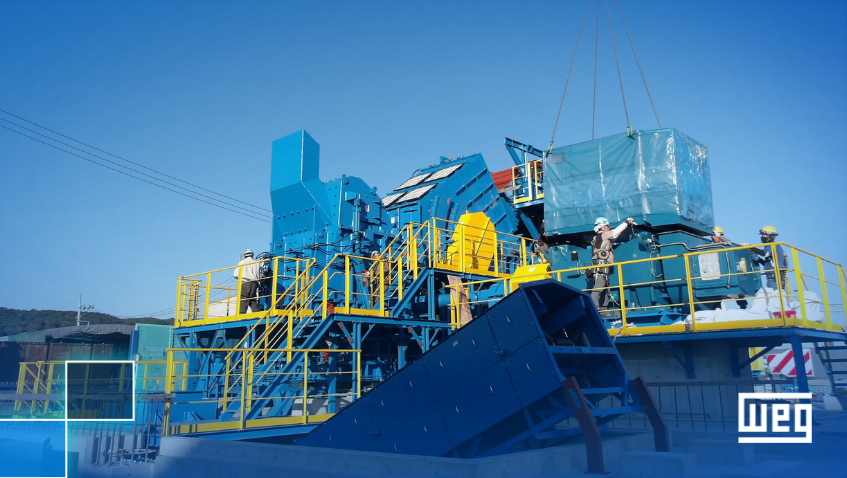Operações circulares e eficientes
A economia circular busca maximizar o valor dos recursos enquanto minimiza o desperdício e os impactos ambientais. Nesse modelo, os produtos são projetados para serem duráveis, reparáveis e recicláveis, incentivando o reuso e a reciclagem de materiais. Em vez de seguir o tradicional modelo linear de produção e consumo, em que os produtos são fabricados, usados e descartados, a economia circular promove a ideia de um ciclo contínuo, onde os materiais são mantidos em uso pelo maior tempo possível.
Essa abordagem não apenas contribui para a conservação dos recursos naturais, mas também estimula a inovação, a criação de empregos e o crescimento econômico sustentável, tornando-se essencial para enfrentar os desafios globais de hoje, como as mudanças climáticas e a escassez de recursos.
Consolidando o compromisso WEG, possuímos certificações ISO 14.001 demonstrando a gestão ambiental nas operações da empresa.
Programas & Práticas
Resíduos e energia
Resíduos sólidos
A WEG possui um sistema de coleta seletiva de resíduos em suas operações. Dessa forma, os resíduos são separados e enviados para os recicladores de cada um dos materiais, possibilitando assim a valorização desses e a reintrodução dos materiais nos mais diversos ciclos produtivos. É importante enfatizar que parte dos resíduos gerados nas operações são reciclados pela própria WEG, retornando assim ao processo e fazendo parte dos seus produtos. Todos os resíduos são enviados para empresas ambientalmente responsáveis, selecionadas e desenvolvidas pela equipe de gestão ambiental da WEG.
Energia
A WEG possui Política de Eficiência Energética, desde 2012, na qual demonstra o seu compromisso com a gestão desse insumo. Essa política é desdobrada em ações para o monitoramento e a redução do consumo de energia, o que contribui para a melhoria do meio ambiente. A WEG pretende tornar, cada vez mais, suas fontes de energia mais limpas, renováveis e sustentáveis.
Água, efluentes e recursos hídricos
A WEG monitora o consumo de água das suas operações e possui diversos controles operacionais que garantem uma gestão eficiente sobre esse recurso, evitando assim o desperdício e promovendo um consumo consciente. Todos os efluentes gerados nas operações são devidamente tratados e periodicamente monitorados, de forma a garantir o atendimento das legislações e a minimizar os impactos nos diferentes stakeholders.
Parte dos efluentes tratados nas operações são reutilizados nos processos internos, sendo que algumas estações de tratamento de efluentes possibilitam até 100% de reúso do efluente tratado. Adotamos iniciativas focadas na redução do consumo de água e da geração de efluentes, através do controle de vazamentos, do monitoramento do consumo e do apoio aos programas que engajam todos os colaboradores a esse objetivo, como o KaizenWEG e o WEG Manufacturing System.

Investimentos e despesas em meio ambiente
Os investimentos ambientais são caracterizados em três categorias:
- Controle ambiental: relacionado com tratamento e disposição de resíduos, tratamento de emissões atmosféricas e líquidas, seguros de responsabilidade ambiental e depreciação de equipamentos e despesas com materiais e serviços de manutenção.
- Equipamentos: relacionados à aquisição de equipamentos para controle ambiental.
- Gestão: relacionado à remuneração de profissionais de treinamento que exercem atividades de gestão ambiental, pesquisa e desenvolvimento, e à certificação de sistemas de gestão ambiental.

Embalagens sustentáveis e preservação da biodiversiade
Possuímos uma fábrica de embalagens, a RF Reflorestadora, localizada no Brasil.
Essa unidade produz todas as embalagens de madeira utilizadas em nossas diversas linhas de produto. Para isso, contamos com áreas de reflorestamento próprias que garantem o fornecimento contínuo de madeira e a preservação desse recurso natural e de áreas de florestas naturais, reserva legal e áreas de preservação permanente que ajudam na conservação da biodiversidade local.
As áreas atendem todas legislações e requisitos legais, bem como uma área de conservação de florestas nativas muito superior ao mínimo da reserva legal estabelecida.
Além disso, a WEG promove e apoia iniciativas de reflorestamento consciente e conservação da natureza e investe na arborização de seus parques fabris.

KaizenWEG
O KaizenWEG foi criado em 2016 e é o coração do sistema de gestão de melhoria contínua da WEG, o WMS, onde todos os colaboradores são incentivados a promover melhorias em seu ambiente de trabalho ou em quaisquer outras áreas da empresa, identificando desperdícios, analisando causas e participando de times multidisciplinares para a resolução de problemas.
Sendo um dos pilares da Gestão Participativa da Companhia, desde sua criação mais de 300 mil melhorias foram implantadas, trazendo mais segurança, qualidade e produtividade, além de tornar o ambiente de trabalho cada vez mais eficiente e sustentável.
A busca coletiva pela excelência operacional e sustentabilidade em um cenário de verticalização de processos faz da gestão participativa peça chave para a potencialização de resultados da WEG.
Confira o vídeo do lançamento da nova plataforma do KaizenWEG:

WMS (WEG Management System)
O sistema de gestão de melhoria contínua da WEG é o WMS, que tem como principal objetivo a identificação e eliminação de perdas e desperdícios.
Os resultados são maximizados através das matrizes de priorização de segurança, qualidade, custo e emissões de GEE (gases de efeito estufa), que direcionam a ocorrência de projetos de otimização ou eliminação destes desperdícios, contribuindo para um mundo mais eficiente e sustentável.
Além das frentes de trabalho de otimização, times multidisciplinares atuam como pontos focais de melhoria contínua, trazendo inovações e disrupções nos nossos processos.
Um destes pontos focais é o pilar de Meio Ambiente e Energia, que objetiva e sistematiza a redução de impactos ambientais, atuando para reduzir ou eliminar a geração de resíduos e emissões, o consumo de recursos energéticos, limpezas químicas e insumos em geral.
Plano de troca
Reciclagem é assunto sério para a WEG, estendido até o seu negócio. Com o programa de reaproveitamento de motores elétricos, “Plano de Troca”, a companhia concede um desconto na compra de um motor novo com rendimento superior ao exigido por lei na troca por um usado. Além do benefício financeiro aos clientes, a iniciativa garante que o motor usado com baixo nível de eficiência seja removido de uso. Depois de recolhidos pela companhia, os motores são desmontados e separados em peças para envio a recicladores credenciados e rastreados.
Vantagens
Redução do consumo de energia elétrica
Confiabilidade da planta
Redução dos custos operacionais
Garantia de fábrica
Produtos normalizados – oferecem total intercambiabilidade com motores já instalados
Item | 2021 | 2022 | 2023 | 2024 |
Produtos vendidos que podem ser reutilizados ou reciclados* (%) – Base em peso | 68 | 73 | 65 | 70 |
Produtos que foram realmente reaproveitados ou reciclados pela empresa * (%) – Base em peso | 12 | 16 | 14 | 4 |
* Leva em consideração somente os produtos colocados e recolhidos no mercado Brasil
Investimentos em meio ambiente
Os investimentos ambientais são caracterizados em duas categorias:
Investimentos de Capital: Referentes à aquisição de equipamentos para controle ambiental.
Despesas Operacionais (R$): Referentes ao tratamento e destinação de resíduos, tratamento de emissões atmosféricas e líquidas, seguros de responsabilidade ambiental e depreciação de equipamentos, além de despesas com materiais e manutenção, além das despesas com remuneração de pessoal que atua na gestão ambiental, pesquisa e desenvolvimento e certificação de sistemas de gestão ambiental.
Abaixo o montante investido em cada categoria:
Item | 2021 | 2022 | 2023 | 2024 |
Investimento de capital (R$) | 1.329.000 | 1.788.000 | 1.819.000 | 11.141.393 |
Despesas Operacionais (R$) | 14.684.000 | 17.753.000 | 23.509.000 | 33.605.910 |
| % de cobertura (%) | 70 | 70 | 70 | 89 |
Certificação Ambiental
Em 2024, considerando o escopo de colaboradores, 70,8% do grupo WEG estava coberto pela certificação ISO 14001.
Clique aqui para acessar nossos certificados
Auditorias Ambientais
A WEG possui um processo de ciclo de auditorias ambientais que cobre todas as suas operações industriais.
Dentro do seu processo anual de auditorias ambientais, a WEG garante o atendimento às legislações ambientais de todas as suas operações industriais.
Indicadores de Performance
Em 2023, o escopo das unidades monitoradas foi ampliado, incluindo os endereços comerciais da empresa. Dessa forma, 100% dos endereços globais da WEG agora estão contemplados nos indicadores.
Energia
A WEG possui Política de Eficiência Energética, desde 2012, na qual demonstra o seu compromisso com a gestão desse insumo. Essa política é desdobrada em ações para o monitoramento e a redução do consumo de energia, o que contribui para a melhoria do meio ambiente. A WEG pretende tornar, cada vez mais, suas fontes de energia mais limpas, renováveis e sustentáveis.
Consumo total de energia | Unidade | 2021 | 2022 | 2023 | 2024 |
Consumo total de energia Não-Renovável | MWh | 535.599 | 510.110 | 454.702 | 212.113 |
Consumo total de energia Renovável | MWh | 57.801 | 88.904 | 129.202 | 427.398 |
Consumo total de energia (Não-Renovável + Renovável) | MWh | 593.400 | 599.014 | 583.904 | 639.511 |
Dados de cobertura (%) | Em relação à funcionários | 100 | 100 | 100 | 100 |
Aquisição de energia renovável
Em 2024, a WEG garantiu que 66,8% do consumo de energia fosse proveniente de fontes renováveis com garantia de origem por meio autoprodução, compra de certificados de energia renovável (I-REC) e contratos bilaterais.
Emissões Atmosféricas
A WEG realiza o monitoramento das emissões atmosférica relacionadas aos compostos orgânicos voláteis. Abaixo segue o resultado das emissões relacionadas aos equipamentos monitorados nos últimos anos.
Item | 2019 | 2020 | 2021 | 2022 | 2023 | 2024 |
Emissões de compostos orgânicos voláteis - VOC (t/ano) | 93,5 | 135,2 | 114,5 | 139,3 | 191,3 | 241,3 |
Taxa de cobertura (%) | 56 | 56 | 56 | 61 | 72 | 61 |
Violações Ambientais
Uma das principais prioridades da WEG é a conformidade com a legislação ambiental aplicável às suas operações. Nos últimos 4 anos, não houve evidências de multas ambientais significativas aplicadas aos negócios da WEG.




